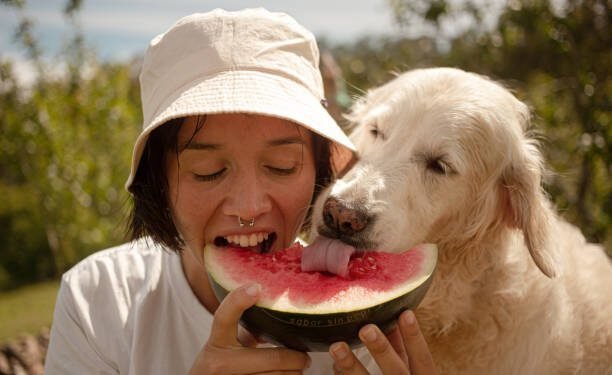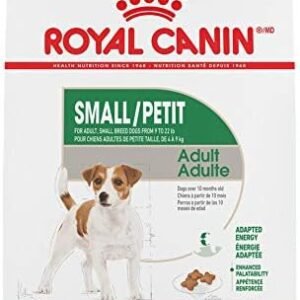Have you ever found yourself lounging in the sun, indulging in a slice of juicy watermelon on a hot summer day, and suddenly wondered, “Can my furry friend enjoy this refreshing treat too?” Watermelon, with its vibrant pink flesh and sweet, hydrating nature, is a beloved fruit for humans during scorching summer months. But what about our loyal canine companions? In this article, we embark on a journey to uncover the truth about dogs and watermelon. Can dogs eat watermelon? Are there benefits to offering this summery delight to our four-legged friends? And, of course, what precautions should you take to ensure your dog’s well-being?
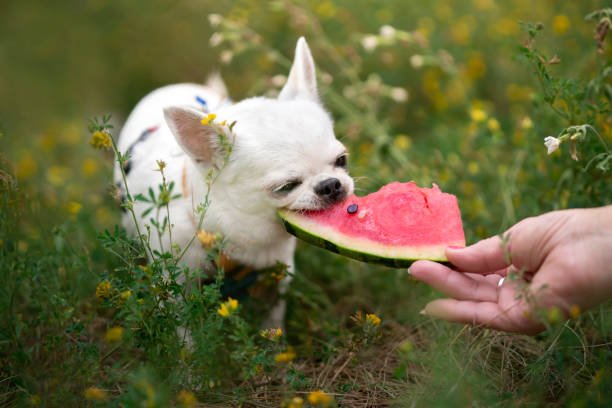
Table of Contents
Can Dogs Eat Watermelon?
Now that we’ve established that dogs can enjoy watermelon in moderation and explored the potential benefits and precautions, let’s dive deeper into the specifics of this delightful fruit. Can dogs eat watermelon without any concerns, and what exactly does watermelon bring to the table in terms of nutrition and potential drawbacks?
Is Watermelon Safe for Dogs?
Before we delve into the nutritional aspects of watermelon, let’s address the primary concern: is watermelon safe for dogs? As mentioned earlier, the short answer is yes, watermelon is generally safe for dogs. It is not considered toxic or dangerous to them. However, as with any food, there are some important considerations.

A Nutrient-Rich Fruit
Watermelon is not just a tasty and refreshing treat; it also offers some nutritional benefits for dogs. This succulent fruit is primarily composed of water, making it an excellent choice to help keep your dog hydrated, especially during hot weather. Adequate hydration is crucial for a dog’s overall health, as it aids in digestion and regulates body temperature.
A Bounty of Vitamins and Minerals
Beyond hydration, watermelon provides a range of essential vitamins and minerals that can contribute to your dog’s well-being. It contains vitamin A, which is vital for vision and immune function, as well as vitamin C, known for its antioxidant properties that help combat free radicals and boost the immune system. Additionally, watermelon is a source of vitamin B6, which plays a role in brain development and function.
In terms of minerals, watermelon contains potassium, a crucial electrolyte that helps maintain proper muscle and nerve function in dogs. This combination of vitamins and minerals underscores the potential benefits of incorporating watermelon into your dog’s diet in moderation.
A Closer Look at the Nutritional Profile
Let’s take a closer look at the nutritional content of watermelon. Here’s a basic breakdown per 100 grams of watermelon:
| Nutritional Content | Amount |
|---|---|
| Calories | Approximately 30 kcal |
| Water | Over 90% |
| Carbohydrates | About 7.5 grams |
| Sugars | Roughly 6 grams |
| Fiber | Approximately 0.4 grams |
| Protein | Around 0.6 grams |
| Fat | Almost no fat |
This profile highlights the hydrating and low-calorie nature of watermelon, making it a suitable treat option, particularly for dogs that need to manage their weight or have weight-related concerns.
Potential Drawbacks of Feeding Watermelon to Dogs
While watermelon has its merits, it’s essential to consider potential drawbacks and exercise caution when offering it to your dog.
High Sugar Content
One aspect to be mindful of is the natural sugar content in watermelon. Although it is relatively low in calories, watermelon is relatively high in natural sugars, with around 6 grams of sugar per 100 grams. Excessive sugar consumption can lead to weight gain and dental issues in dogs, just as it can in humans. Therefore, it’s crucial to be conscious of portion sizes and the frequency of offering watermelon as a treat.
Digestive Upset
As previously mentioned, overindulging in watermelon can lead to digestive upset in dogs, including diarrhea or vomiting. It’s essential to introduce new foods gradually into your dog’s diet and monitor their response carefully. If you notice any signs of digestive discomfort, reduce the quantity of watermelon provided.
Allergies and Sensitivities
While rare, some dogs may have allergies or sensitivities to watermelon. It’s always a good practice to start with a small amount and observe your dog for any adverse reactions, such as itching, hives, or digestive upset. If you notice any signs of an allergic reaction, discontinue feeding watermelon immediately and consult with your veterinarian.
Conclusion: A Treat, Not a Substitute
In conclusion, watermelon can be a delightful and nutritious addition to your dog’s diet when served responsibly. It offers hydration, essential vitamins, and a low-calorie treat option. However, it should never replace your dog’s primary diet of high-quality dog food formulated to meet their specific nutritional needs.
Think of watermelon as an occasional indulgence to share with your furry friend, especially during sunny summer days. When served in moderation and with careful attention to potential sensitivities, watermelon can be a tasty and refreshing treat that enhances your dog’s overall well-being.
As a responsible pet owner, always prioritize your dog’s health and happiness above all else. Consult with your veterinarian before making any significant dietary changes for your dog, including introducing watermelon or any new food into their diet. Your vet can provide personalized guidance based on your dog’s unique needs, ensuring that their diet remains balanced and tailored to support their optimal health.
So, the next time you savor a juicy slice of watermelon, you can feel confident about sharing a small, delicious piece with your furry companion. Just remember to do so in moderation, keeping their best interests in mind, and you’ll both enjoy the simple pleasures of summertime together.
How Much Watermelon Can a Dog Eat?
Now that we know dogs can enjoy watermelon, the next important question is, how much watermelon can a dog eat? The key to offering watermelon to your furry friend is moderation. While watermelon can be a tasty and healthy treat, it should never make up a significant portion of your dog’s daily calorie intake.
The 10% Rule
A good rule of thumb to follow is the “10% rule.” This guideline suggests that treats, including watermelon, should account for no more than 10% of your dog’s daily calorie intake. The remaining 90% should come from their regular, balanced dog food.
Start Small and Observe
When introducing watermelon to your dog’s diet, it’s essential to start with a small piece and observe how they react. Not all dogs will have the same tolerance for new foods, so it’s best to be cautious. Begin by offering a small, bite-sized portion of watermelon and pay attention to your dog’s response. Look for any signs of allergies or digestive upset, such as itching, hives, or changes in stool.
Preparation Matters
The way you prepare and serve watermelon to your dog is also crucial. Always remove the seeds and the tough outer rind before offering it to your furry companion. Watermelon seeds can pose a choking hazard, and the rind can be challenging for dogs to digest. What you want to serve is the juicy, red flesh of the fruit, free from any potentially harmful components.
Consider Your Dog’s Size and Breed
Keep in mind that the size and breed of your dog can influence how much watermelon they can tolerate. Larger dogs may be able to enjoy slightly larger portions without issue, while smaller dogs should receive smaller amounts. It’s essential to adjust the serving size based on your dog’s weight and individual needs.
Appropriate Serving Sizes
To provide a rough idea of appropriate serving sizes, here’s a general guideline based on your dog’s weight:
- Small Dogs (up to 20 pounds): Start with a teaspoon-sized piece of watermelon and monitor their reaction.
- Medium Dogs (20 to 50 pounds): Begin with a tablespoon-sized portion and observe how they respond.
- Large Dogs (50 pounds and above): You can offer up to a quarter cup of watermelon, but still, keep a close eye on their reaction.
Remember that these are just starting points, and individual dogs may have varying tolerances. Always err on the side of caution, especially if it’s the first time your dog is trying watermelon.
Ensuring a Healthy Balance
While watermelon can be a delightful addition to your dog’s diet, it’s crucial to maintain a healthy balance. As mentioned earlier, watermelon should not replace your dog’s regular meals, which should primarily consist of high-quality dog food specially formulated to meet their specific nutritional needs.
Think of watermelon as an occasional treat, a special indulgence to share during those sunny summer days. Ensuring that treats like watermelon remain within the 10% guideline is essential to maintaining your dog’s overall health and well-being.
Special Considerations
In addition to the general guidelines mentioned above, there are some special considerations to keep in mind when offering watermelon to your dog.
Age and Health Status
The age and health status of your dog can play a significant role in how much watermelon they can safely consume. Puppies, senior dogs, and dogs with specific health conditions may have different dietary needs. It’s advisable to consult with your veterinarian to determine the best approach for your individual dog.
Frozen Watermelon Treats
For an extra special summertime treat, consider serving frozen watermelon cubes to your dog. These icy delights not only offer the hydrating benefits of watermelon but also help keep your furry friend cool during hot days. To prepare frozen watermelon treats, cut the fruit into small cubes, remove seeds and rind, and freeze them. Just remember to limit the portion size based on your dog’s weight, and enjoy watching them savor this refreshing delicacy.
Always Consult Your Vet
Before making any significant changes to your dog’s diet, including introducing new foods like watermelon, it’s advisable to consult with your veterinarian. Your vet can provide personalized guidance based on your dog’s specific nutritional needs and potential sensitivities, ensuring their health remains a top priority.
In conclusion, while watermelon can be a delightful and nutritious treat for your dog, moderation is the key to ensuring their well-being. Follow the 10% rule, start with small portions, and consider your dog’s size and individual needs when offering watermelon. By doing so, you can share the joy of this summery snack with your canine companion while keeping them healthy and happy. Remember, a healthy diet is the foundation of a happy and vibrant life for your furry friend, so make every treat count!
The Risks of Feeding Watermelon to Dogs
While we’ve highlighted the benefits of feeding watermelon to dogs, it’s equally important to be aware of the potential risks and challenges associated with offering this delicious fruit to your furry friend. Understanding these risks can help you make informed decisions about including watermelon in your dog’s diet.
Food Allergies and Intolerance
One of the primary concerns when introducing any new food to your dog’s diet is the possibility of food allergies or intolerance. While watermelon is not a common allergen for dogs, some individuals may exhibit adverse reactions. These reactions can manifest as itching, hives, or digestive upset, such as diarrhea or vomiting.
Allergic Reactions
It’s crucial to be vigilant for signs of allergic reactions in your dog when offering watermelon or any new treat. Allergic reactions can vary in severity and may include:
- Itching and Scratching: Excessive itching, especially around the face, paws, or rear end, can be a sign of an allergic response.
- Hives: Raised, red welts or hives on your dog’s skin are another potential indicator of an allergic reaction.
- Swelling: Pay close attention to your dog’s face and muzzle for any swelling, as this can be a serious sign of an allergic response.
Gastrointestinal Distress
Beyond allergic reactions, feeding your dog too much watermelon or introducing it too quickly into their diet can lead to gastrointestinal distress. This may include symptoms such as:
- Diarrhea: Watery stools or increased bowel movements can be a result of excessive watermelon consumption.
- Vomiting: Some dogs may vomit if they’ve consumed too much watermelon, as their stomach may struggle to digest it.
Hazards in Watermelon Components
While the juicy, red flesh of watermelon is generally safe for dogs, certain components should be avoided. As mentioned earlier, it’s essential to remove the seeds and the tough outer rind before offering watermelon to your dog. Let’s delve a bit deeper into why these precautions are necessary:
Seeds
Watermelon seeds can pose a choking hazard to dogs, particularly small breeds. Swallowing seeds can also lead to digestive problems if they become lodged in the digestive tract. Therefore, it’s crucial to ensure that the watermelon you provide is seedless.
Rind
The tough outer rind of watermelon is challenging for dogs to digest and can potentially lead to gastrointestinal discomfort or blockages. Dogs lack the digestive enzymes necessary to break down the rind efficiently, so it’s best to serve only the soft, red flesh of the fruit.
Monitoring for Adverse Reactions
To safeguard your dog’s health and well-being, it’s essential to monitor them closely when introducing watermelon into their diet. Here are some key signs and symptoms to watch for:
- Excessive Itching or Scratching: If your dog starts scratching excessively or seems uncomfortable, it may be an indication of an allergic reaction.
- Hives or Swelling: Immediately seek veterinary attention if you notice hives or swelling on your dog’s skin or face.
- Diarrhea or Vomiting: Keep an eye on your dog’s bowel movements, and if you observe persistent diarrhea or vomiting, discontinue feeding watermelon and consult with your veterinarian.
Special Considerations
Certain dogs may be more susceptible to adverse reactions when consuming watermelon. Puppies, senior dogs, or dogs with specific health conditions may have higher sensitivity levels. It’s advisable to consult with your veterinarian before introducing watermelon or any new food into the diet of these dogs.
Ensuring a Safe and Enjoyable Treat
In conclusion, while watermelon can offer several health benefits and serve as a tasty treat for your dog, it’s crucial to be aware of the potential risks associated with it. Allergic reactions, gastrointestinal distress, and hazards related to seeds and rind should not be underestimated.
As a responsible pet owner, always prioritize your dog’s health and safety. If you choose to offer watermelon, do so in moderation and with careful consideration of your dog’s individual needs and sensitivities. Remember to remove seeds and rind, monitor your dog for adverse reactions, and consult with your veterinarian if you have any concerns.
In the end, the joy of sharing a slice of watermelon with your four-legged friend can be a delightful experience, but it should always be approached with caution and responsibility. When done correctly, watermelon can be a safe and enjoyable occasional treat for your furry companion, contributing to their happiness and well-being.
How to Make Watermelon a Delicious Treat for Your Dog
Now that we’ve established that watermelon can be a safe and healthy treat for dogs when given in moderation, let’s explore various ways to feed watermelon to your furry friend and make it an enjoyable experience for them.
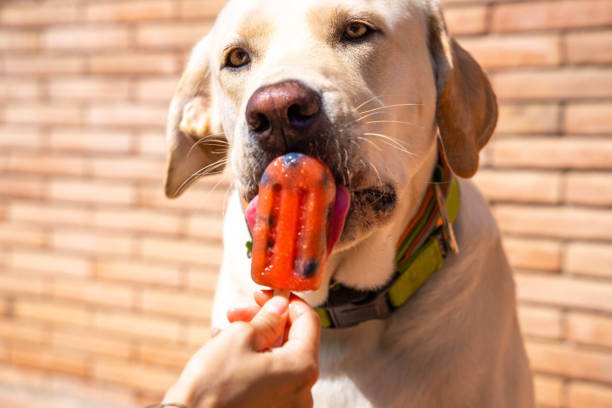
Fresh and Frozen Treats
- Fresh Watermelon Chunks: The simplest way to share watermelon with your dog is by cutting it into small, bite-sized chunks. Ensure that you’ve removed all the seeds and the tough outer rind, leaving only the juicy, red flesh. These fresh watermelon chunks can be served as a standalone treat or added to your dog’s regular meals for an extra burst of flavor and hydration.
- Frozen Watermelon Cubes: During scorching summer days, your dog will appreciate the icy relief of frozen watermelon. To make frozen watermelon cubes, cut the fruit into small pieces, remove the seeds and rind, and place them in the freezer. Once frozen, offer these cool and refreshing cubes to your dog as a special treat. It’s a delightful way to keep them hydrated and entertained.
Food Toppers and Mixers
- Watermelon Food Topper: If you’re looking to enhance your dog’s regular meals, consider using watermelon as a food topper. Chop the watermelon into small pieces and sprinkle them over your dog’s kibble or wet food. This not only adds a delicious flavor but also provides moisture and extra nutrients.
Homemade Watermelon Dog Treats
- Watermelon Popsicles: Create homemade watermelon popsicles for your dog by blending watermelon chunks and a bit of water. Pour the mixture into ice cube trays or silicone molds and freeze until solid. Your pup will love gnawing on these refreshing treats during hot weather.
- Watermelon Smoothies: Blend watermelon with other dog-friendly fruits like bananas, strawberries, or blueberries to make a fruity watermelon smoothie. You can also add a splash of water for extra hydration. Pour the smoothie into your dog’s bowl or freeze it into small portions for an icy delight.
- Watermelon Muffins: If you enjoy baking, you can try your hand at making watermelon muffins for your dog. These muffins can be a wholesome snack or occasional treat. Combine ingredients like oat flour, rolled oats, applesauce, egg, honey, and a bit of grated watermelon zest. Bake until they’re golden brown and let them cool before serving.
Recipe Ideas
To get you started on making delightful watermelon treats for your dog, here are a couple of simple recipes:

Watermelon Pup Popsicles:
Ingredients:
- 2 cups of seedless watermelon chunks
- 1/2 cup of plain yogurt
Instructions:
- Blend the watermelon chunks until smooth.
- Mix the watermelon puree with plain yogurt.
- Pour the mixture into ice cube trays or silicone molds.
- Freeze until solid.
- Offer these refreshing pup popsicles to your dog on hot days.
Watermelon Berry Smoothie:
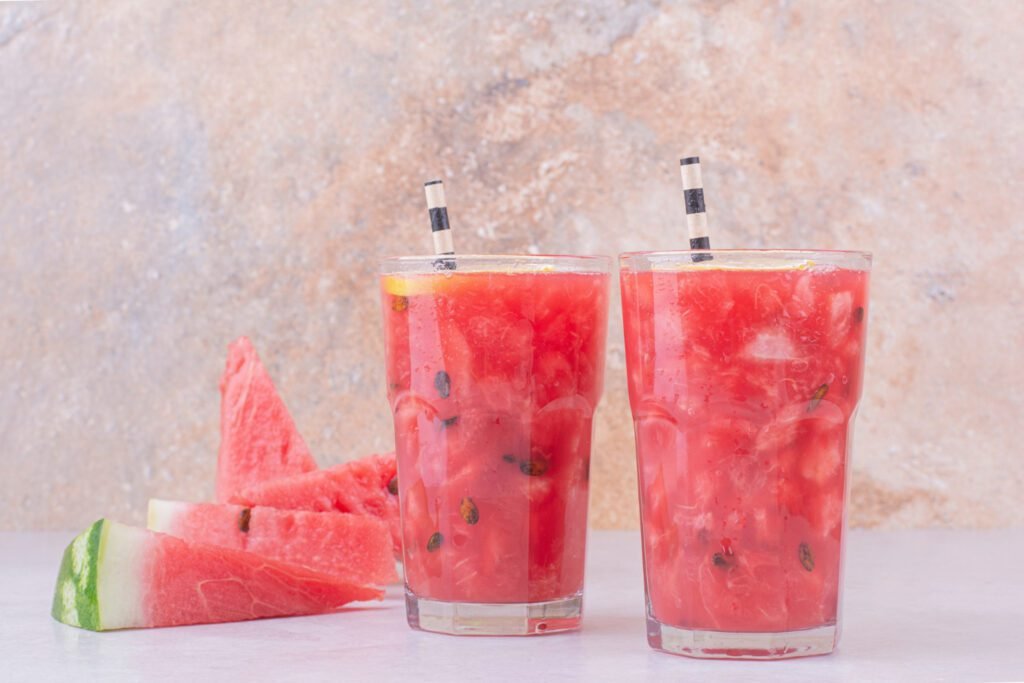
Ingredients:
- 1 cup of seedless watermelon chunks
- 1/2 cup of blueberries
- 1/2 banana
- 1/2 cup of water
Instructions:
- Blend the watermelon, blueberries, banana, and water until smooth.
- Pour the smoothie into your dog’s bowl.
- Serve it as a hydrating and nutritious treat.
Remember that while these homemade watermelon treats can be a delightful addition to your dog’s diet, they should also be offered in moderation. Monitor your dog’s response to ensure they tolerate the treats well. If you notice any adverse reactions, discontinue feeding the treats and consult with your veterinarian.
Incorporating watermelon into your dog’s diet can be a fun and healthy way to bond with your furry companion. Whether you opt for fresh chunks, frozen cubes, food toppers, or homemade creations, the key is to prioritize your dog’s well-being and ensure they enjoy these treats responsibly.
10 FAQs About Can Dogs Eat Watermelon
As the idea of sharing watermelon with your canine companion gains popularity, you may find yourself with some burning questions about this juicy fruit and its suitability for your dog’s diet. To help address your concerns and ensure the safety and well-being of your furry friend, we’ve compiled a list of frequently asked questions (FAQs) about dogs and watermelon.
1. Can all dogs eat watermelon?
Yes, in general, most dogs can enjoy small amounts of watermelon without issue. However, individual dogs may have allergies, sensitivities, or medical conditions that affect their ability to digest certain foods. Always introduce watermelon cautiously and monitor your dog for any adverse reactions.
2. Is it safe for puppies to eat watermelon?
Puppies can have watermelon in moderation once they are weaned and have started eating solid food. Just like adult dogs, puppies should be given small, bite-sized pieces of watermelon to ensure they can digest it comfortably.
3. Can watermelon replace a dog’s regular diet?
No, watermelon should never replace your dog’s primary diet, which should consist of high-quality dog food formulated to meet their specific nutritional needs. Watermelon should only be an occasional treat or addition to their diet.
4. What should I do if my dog eats watermelon seeds or rind by accident?
If your dog accidentally ingests a few watermelon seeds or a small amount of the rind, it’s unlikely to cause harm. However, if you suspect your dog has ingested a large quantity or if they show signs of distress, consult your veterinarian immediately.
5. Can diabetic dogs eat watermelon?
Watermelon contains natural sugars, so it should be given in moderation to dogs with diabetes. Monitor your dog’s blood sugar levels and consult with your vet to determine an appropriate portion size.
6. Is it safe for dogs with kidney issues to eat watermelon?
If your dog has kidney issues, it’s essential to consult your veterinarian before introducing any new food, including watermelon. Watermelon’s high water content may be beneficial for hydration, but its potassium levels should be considered in the context of your dog’s specific condition.
7. Are there any watermelon parts that dogs should never eat?
Dogs should never consume watermelon seeds or the tough outer rind. Watermelon seeds can pose a choking hazard and the rind is difficult for dogs to digest. Serve only the juicy, red flesh of the fruit.
8. Can my dog eat watermelon every day?
No, watermelon should be an occasional treat rather than a daily occurrence. Too much of any new food can lead to digestive upset or other health issues. Balance is key.
9. How much watermelon is safe for my dog to eat?
The appropriate serving size of watermelon for your dog depends on their size and weight. As a general guideline, a few small chunks or cubes of watermelon should suffice for smaller dogs, while larger dogs can enjoy slightly more. Always start with a small amount and observe your dog’s reaction.
10. Can dogs eat watermelon during the winter months?
Yes, dogs can eat watermelon year-round. While watermelon is particularly refreshing during hot summer days, it can still be a nutritious and enjoyable treat in colder weather. Adjust the serving size based on the temperature and your dog’s activity level.
In summary, watermelon can be a safe and healthy occasional treat for most dogs when offered in moderation and prepared correctly. However, it’s crucial to be mindful of your dog’s individual needs and any potential allergies or sensitivities. As with any dietary change, it’s a good practice to consult with your veterinarian before adding watermelon or any new food to your dog’s diet. Enjoy sharing this summery snack with your canine companion, and prioritize their well-being and health above all else.
Conclusion
In conclusion, watermelon can indeed be a refreshing and healthy occasional treat for your canine companion, provided it is offered responsibly and in moderation. It offers hydration, essential vitamins, and a low-calorie option for dogs that need to manage their weight. However, it’s essential to follow certain guidelines to ensure your dog’s safety and enjoyment.
Remember to remove all seeds and the tough outer rind before serving, and start with small, bite-sized pieces to monitor your dog’s reaction. While watermelon is generally safe, always be cautious if your dog has allergies or sensitivities to new foods.
However, it’s important to emphasize that watermelon is not a dietary necessity for dogs. Their primary diet should consist of high-quality dog food formulated to meet their specific nutritional needs. If you’re looking for alternative treats, consider dog-safe fruits like apples, blueberries, or slices of carrot. These options offer nutritional benefits without the need for special precautions.
As you explore the world of treats for your furry friend, always prioritize their well-being and health. If you have any questions or would like to share your experiences with feeding watermelon or other treats to your dog, feel free to join the conversation in the comment section below. We’d love to hear from you and provide any additional information or guidance you may need.

















